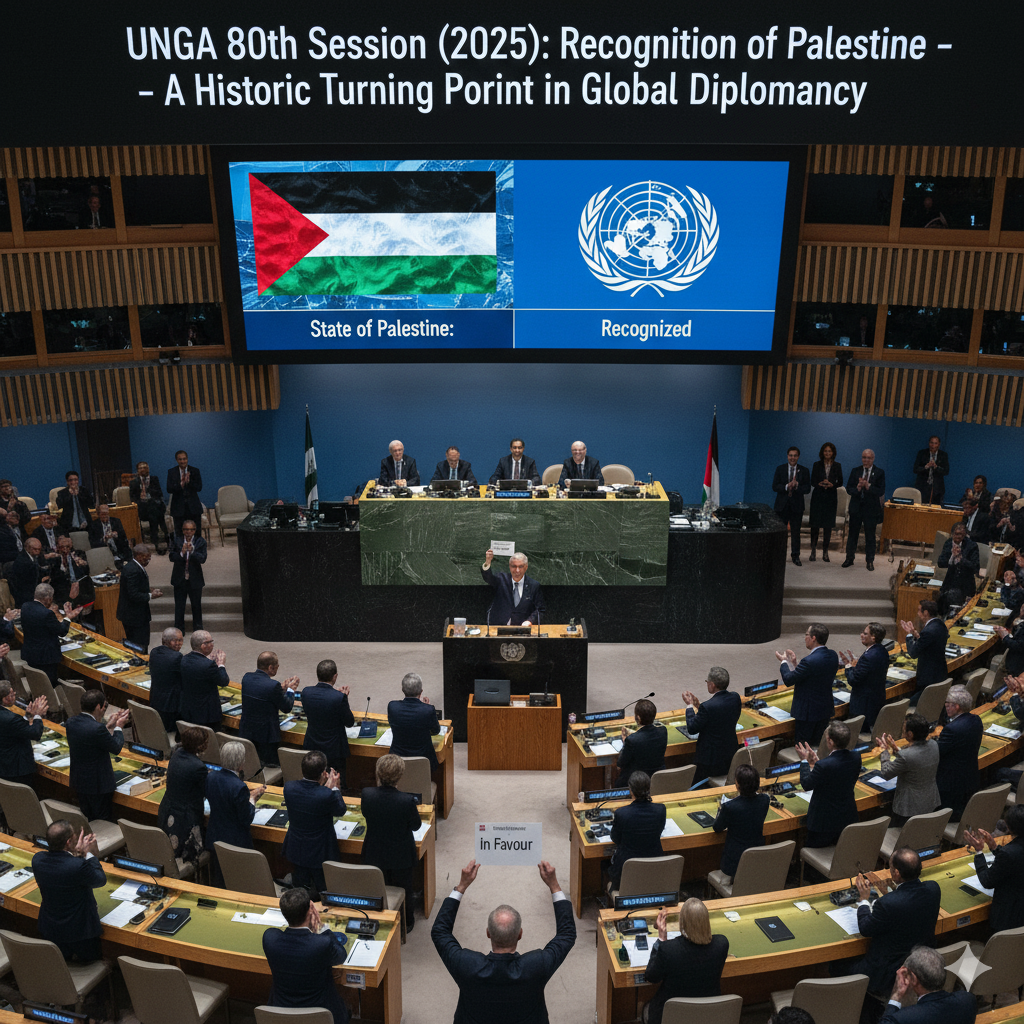Introduction: A Defining Diplomatic Moment
In September 2025, the United Kingdom prepared to take a historic step on the global stage. Prime Minister Keir Starmer was poised to announce the formal recognition of a Palestinian state during the 80th session of the United Nations General Assembly (UNGA). The decision, set against the backdrop of ongoing Israeli military operations in Gaza and mounting humanitarian crises, represents one of the most consequential foreign policy shifts in recent British history.
The move comes amid growing international momentum. France, Portugal, and several other European nations are expected to follow suit, potentially shifting the diplomatic balance in the decades-long Israeli-Palestinian conflict. But recognition also raises profound questions: Will it advance peace, or deepen divides? Can symbolic recognition translate into tangible change on the ground?
Historical Background: The UK’s Long Ambivalence
The UK has played a pivotal role in the Middle East since the early 20th century. The Balfour Declaration of 1917, in which Britain supported the establishment of a “national home for the Jewish people” in Palestine, set the stage for decades of conflict. After World War II, Britain withdrew from its Mandate role, handing the issue to the United Nations.
For decades, successive British governments maintained a position of cautious neutrality — supporting a two-state solution but avoiding outright recognition of Palestinian statehood. While 139 of 193 UN member states already recognize Palestine, the UK’s reluctance reflected its strategic ties with the United States and Israel, as well as concerns about the peace process.
Starmer’s announcement signals the end of this ambivalence. It aligns the UK with much of the Global South and parts of Europe that view recognition as a necessary step toward justice and lasting peace.
Humanitarian Imperatives: The Gaza Crisis
The timing of this recognition is no coincidence. In 2025, Gaza has been under relentless Israeli military operations following renewed hostilities. Reports indicate thousands of civilian deaths, widespread destruction of infrastructure, and alarming cases of malnutrition — including the death of a child from starvation due to blockades and shortages.
According to the UN Office for the Coordination of Humanitarian Affairs (OCHA), more than 70 percent of Gaza’s population faces food insecurity, while access to clean water and medical care is severely restricted. The International Committee of the Red Cross (ICRC) has warned of a “humanitarian catastrophe of historic proportions.”
Against this backdrop, recognition of Palestine is being framed not just as a political act but as a moral response to systemic suffering and injustice.
European Momentum: France, Portugal, and Beyond
The UK’s decision gains added weight because it is not occurring in isolation. France and Portugal are expected to announce similar steps, signaling a broader European pivot. Spain, Ireland, and Norway had already recognized Palestine earlier, pushing for a stronger EU-wide position.
This growing European momentum could challenge the long-standing US monopoly on Middle East diplomacy. While Washington remains a staunch ally of Israel, internal divisions are growing. Progressive Democrats have increasingly criticized US support for Israel amid mounting civilian casualties.
If more EU nations align with recognition, the pressure on Washington to recalibrate its stance could intensify.
Legal and Diplomatic Implications at the UNGA
Recognition of Palestine by the UK carries both symbolic and practical consequences. Symbolically, it signals moral support for Palestinian statehood, affirming the legitimacy of its struggle for sovereignty. Practically, it strengthens Palestine’s case within international forums.
Palestine already holds non-member observer state status at the UN, a designation it secured in 2012. Formal recognition by major powers like the UK could bolster its bid for full UN membership — something that has long been blocked by US vetoes in the Security Council.
Moreover, recognition adds weight to Palestinian appeals at the International Criminal Court (ICC), where ongoing investigations into alleged war crimes by both Israel and Hamas are underway.
Challenges and Criticisms
While recognition represents progress for Palestinians, critics argue that it risks inflaming tensions without resolving core disputes. Israel has consistently opposed unilateral recognition, insisting that Palestinian statehood must come through direct negotiations. Israeli leaders have warned that moves like this undermine the peace process and reward Hamas’s militant strategies.
Domestically, Starmer faces political challenges too. The decision is likely to spark heated debate within the UK, where pro-Israel lobbying groups hold influence, and sections of the public remain divided.
Furthermore, recognition alone does not address the realities on the ground. The Palestinian Authority remains politically weak, with limited control over Gaza, while Israel continues to expand settlements in the West Bank, making the viability of a contiguous Palestinian state more uncertain.
Global Ripple Effects: Beyond the Middle East
The UK’s recognition of Palestine could have ripple effects beyond the Israeli-Palestinian conflict. It signals a broader reorientation of Western diplomacy toward accountability and justice in international affairs. It also reflects growing frustration with the paralysis of peace talks and the failure of existing frameworks to end cycles of violence.
For the Global South, which has long accused Western powers of double standards, the UK’s move could restore some credibility to international law and multilateralism. It may also strengthen alliances between Europe and Middle Eastern or African nations that have consistently supported Palestinian statehood.
Conclusion: A Step Toward Justice, but Not the End
The UK’s recognition of Palestine marks a watershed moment in the struggle for justice in the Middle East. For Palestinians, it is a long-awaited acknowledgment of their right to statehood. For Israelis, it represents a challenge to reimagine peace not as dominance but as coexistence.
Yet recognition is only the beginning. Without concrete steps — halting settlement expansion, ending blockades, guaranteeing security for both peoples, and addressing humanitarian crises — the symbolism risks ringing hollow.
At its 80th session, the UNGA is once again at the center of history. Britain’s decision, alongside that of other European nations, may not end the conflict, but it signals a shift toward accountability and justice. In a world weary of war and inequality, this recognition could be the spark of a new diplomatic order — one where the rights of the oppressed are no longer deferred but acknowledged as fundamental.







